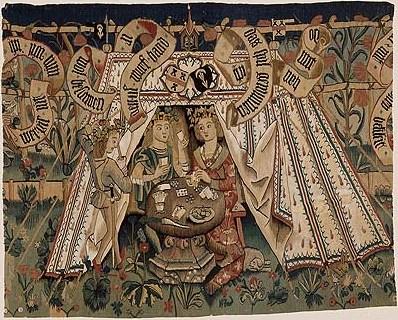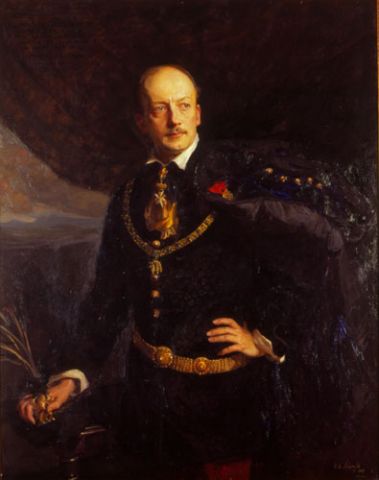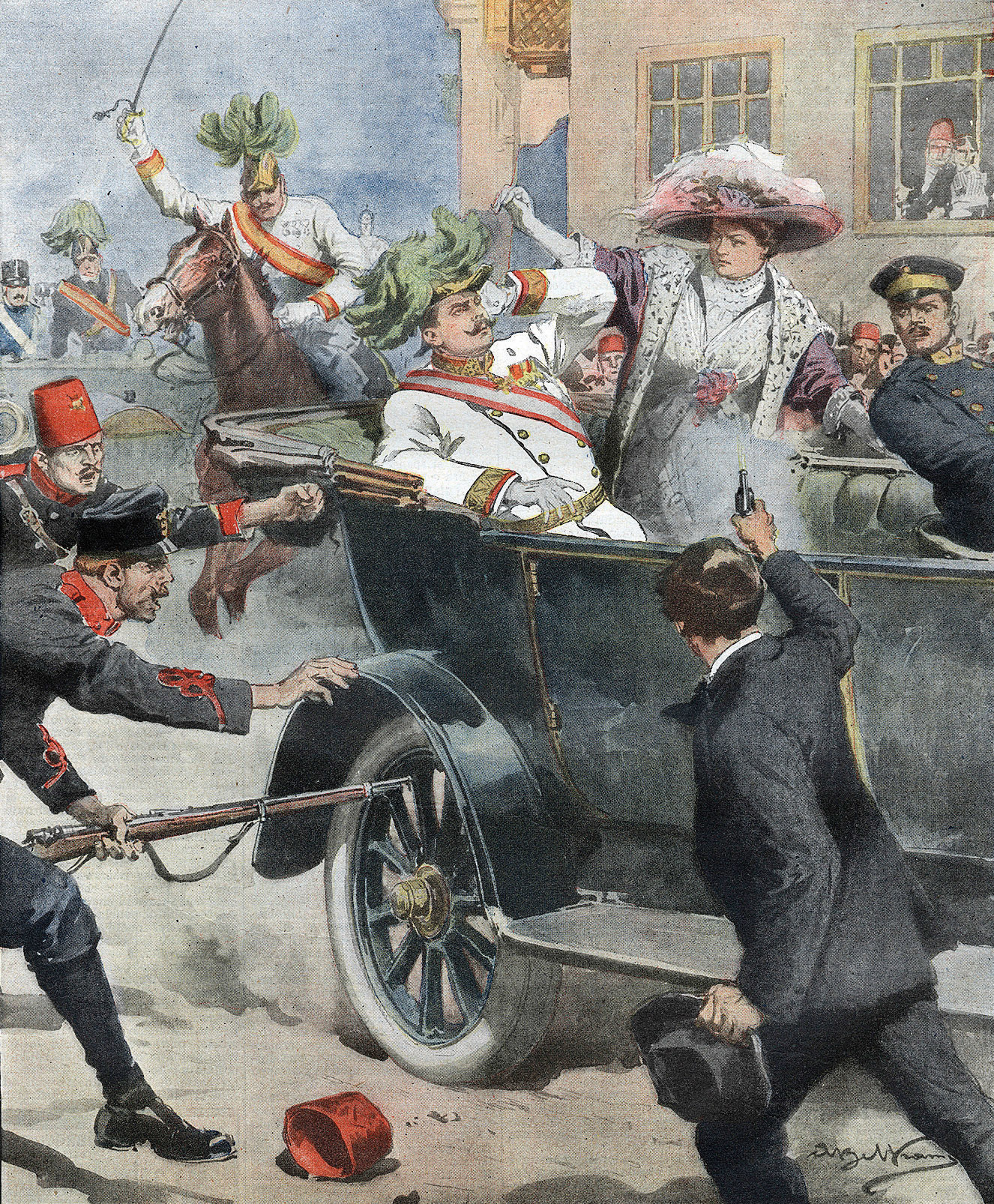|
History Of Germany During World War I
During World War I, the German Empire was one of the Central Powers. It began participation in the conflict after the declaration of war against Serbia by its ally, Austria-Hungary. German forces fought the Allies on both the eastern and western fronts, although German territory itself remained relatively safe from widespread invasion for most of the war, except for a brief period in 1914 when East Prussia was invaded. A tight blockade imposed by the Royal Navy caused severe food shortages in the cities, especially in the winter of 1916–17, known as the Turnip Winter. At the end of the war, Germany's defeat and widespread popular discontent triggered the German Revolution of 1918–1919 which overthrew the monarchy and established the Weimar Republic. Overview Germany's population had already responded to the outbreak of war in 1914 with a complex mix of emotions, in a similar way to the emotions of the population in the United Kingdom; notions of universal enthusiasm known ... [...More Info...] [...Related Items...] OR: [Wikipedia] [Google] [Baidu] |
World War I
World War I or the First World War (28 July 1914 – 11 November 1918), also known as the Great War, was a World war, global conflict between two coalitions: the Allies of World War I, Allies (or Entente) and the Central Powers. Fighting took place mainly in European theatre of World War I, Europe and the Middle Eastern theatre of World War I, Middle East, as well as in parts of African theatre of World War I, Africa and the Asian and Pacific theatre of World War I, Asia-Pacific, and in Europe was characterised by trench warfare; the widespread use of Artillery of World War I, artillery, machine guns, and Chemical weapons in World War I, chemical weapons (gas); and the introductions of Tanks in World War I, tanks and Aviation in World War I, aircraft. World War I was one of the List of wars by death toll, deadliest conflicts in history, resulting in an estimated World War I casualties, 10 million military dead and more than 20 million wounded, plus some 10 million civilian de ... [...More Info...] [...Related Items...] OR: [Wikipedia] [Google] [Baidu] |
Junker
Junker (, , , , , , ka, იუნკერი, ) is a noble honorific, derived from Middle High German , meaning 'young nobleman'Duden; Meaning of Junker, in German/ref> or otherwise 'young lord' (derivation of and ). The term is traditionally used throughout the German-speaking, Dutch-speaking and Scandinavian-speaking parts of Europe. It was also used in the Russian Empire due to Baltic German influence, up until the Russian Revolution. The term is currently still in use by the Georgian Defense Forces for student officers of the National Defence Academy (Georgia), National Defence Academy. Honorific title In Brandenburg, the ''Junker'' was originally one of the members of the higher ''Edelfrei'' (Imperial immediacy, immediate) nobility without or before the accolade. It evolved to a general denotation of a young or lesser noble, sometimes politically insignificant, understood as "country squire". Martin Luther disguised himself as "Junker Jörg" at the Wartburg; he would lat ... [...More Info...] [...Related Items...] OR: [Wikipedia] [Google] [Baidu] |
Leopold Berchtold
Leopold Anton Johann Sigismund Josef Korsinus Ferdinand Graf Berchtold von und zu Ungarschitz, Frättling und Püllütz (, ) (18 April 1863 – 21 November 1942) was an Austria-Hungary, Austro-Hungarian politician, diplomat and statesman who served as List of Foreign Ministers of Austria-Hungary, Imperial Foreign Minister at the outbreak of World War I. Life Early life Born in Vienna on 18 April 1863 as the son of Count Sigismund Berchtold von und zu Ungarschitz, Frättling und Püllütz (1834–1900) and his wife, Countess Josephine von Trauttmansdorff, Trauttmansdorff-Weinsberg (1835–1894). He belonged to a wealthy Austrian nobility, Austrian noble family that owned lands in Margraviate of Moravia, Moravia and Kingdom of Hungary, Hungary. He was reputed to be one of Austria-Hungary's richest men. His paternal grandparents were Count Siegmund Andreas Corsinus Berchtold von und zu Ungarschitz and Countess Ludmilla Maria Theresia Wratislavová z Mitrowicz. His maternal grandp ... [...More Info...] [...Related Items...] OR: [Wikipedia] [Google] [Baidu] |
July Crisis
The July Crisis was a series of interrelated diplomatic and military escalations among the Great power, major powers of Europe in mid-1914, Causes of World War I, which led to the outbreak of World War I. It began on 28 June 1914 when the Serbs of Bosnia and Herzegovina, Bosnian Serb nationalist Gavrilo Princip assassinated Archduke Franz Ferdinand of Austria, Archduke Franz Ferdinand, heir presumptive to the Austria-Hungary, Austro-Hungarian throne, and his wife Sophie, Duchess of Hohenberg. A complex web of alliances, coupled with the miscalculations of numerous political and military leaders (who either regarded war as in their best interests, or felt that a general war would not occur), resulted in an outbreak of hostilities amongst most of the major European states by early August 1914. Following the murder, Austria-Hungary sought to inflict a military blow on Kingdom of Serbia, Serbia, to demonstrate its own strength and to dampen Serbian support for Yugoslavism, Yugoslav ... [...More Info...] [...Related Items...] OR: [Wikipedia] [Google] [Baidu] |
Schlieffen Plan
The Schlieffen Plan (, ) is a name given after the First World War to German war plans, due to the influence of Field Marshal Alfred von Schlieffen and his thinking on an invasion of France and Belgium, which began on 4 August 1914. Schlieffen was Chief of the General Staff of the German Army from 1891 to 1906. In 1905 and 1906, Schlieffen devised an army deployment plan for a decisive (war-winning) offensive against France. German forces were to invade France through the Netherlands, Luxembourg, and Belgium rather than across the common border. After losing the First World War, The German official historians of the and other writers, described the plan as a blueprint for victory. (Colonel-General) Helmuth von Moltke the Younger had succeeded Schlieffen as Chief of the German General Staff in 1906 and was dismissed after the First Battle of the Marne (5–12 September 1914). German historians claimed that Moltke had ruined the plan by tampering with it, out of timidity. Th ... [...More Info...] [...Related Items...] OR: [Wikipedia] [Google] [Baidu] |
Theobald Von Bethmann Hollweg
Theobald Theodor Friedrich Alfred von Bethmann Hollweg (29 November 1856 – 1 January 1921) was a German politician who was chancellor of the German Empire, imperial chancellor of the German Empire from 1909 to 1917. He oversaw the German entry into World War I and played a key role during its first three years. He was replaced as chancellor in July 1917 due in large part to opposition to his policies by leaders in the military. Between 1884 and 1899 Bethmann Hollweg rose rapidly through positions in the Kingdom of Prussia, Prussian government and served briefly as a member of the Reichstag (German Empire), Reichstag in 1890. The experience left him unsympathetic to the party system and an independent for the remainder of his political life. Emperor Wilhelm II appointed him chancellor in 1909, in part because he approved of his conciliatory political style. His eight years as chancellor showed him to be cautiously supportive of some liberalization but also a firm believer that a ... [...More Info...] [...Related Items...] OR: [Wikipedia] [Google] [Baidu] |
Theobald Von Bethmann-Hollweg In Uniform, 1915
Theobald is a Germanic dithematic name, composed from the elements '' theod-'' "people" and ''bald'' "bold". The name arrived in England with the Normans. The name occurs in many spelling variations, including Theudebald, Diepold, Theobalt, Tybalt; in French Thibaut, Thibault, Thibeault, Thiébaut, etc.; in Italian Tebaldo; in Spanish and Portuguese Teobaldo; in Irish Tiobóid; in Czech Děpolt; and in Hungarian Tibold. People called Theobald include: *Saint Theobald of Dorat (990–1070), French saint *Saint Theobald of Marly (died 1247), French saint and Cistercian abbot *Saint Theobald of Provins (1033–1066), French hermit and saint * Theobald (ispán), 12th-century Hungarian nobleman * Theobald of Langres (12th century), number theorist *Theobald I, Duke of Lorraine (c. 1191–1220), the Duke of Lorraine (1213–1220) *Theobald II, Duke of Lorraine (1263–1312), the Duke of Lorraine (1303–1312) * Theobald I, Count of Blois (913–975), the first Count of Blois, C ... [...More Info...] [...Related Items...] OR: [Wikipedia] [Google] [Baidu] |
Food Prices
Food prices refer to the average price level for food across countries, regions and on a global scale. Food prices affect producers and consumers of food. Price levels depend on the food production process, including food marketing and food distribution. Fluctuation in food prices is determined by a number of compounding factors. Geopolitical events, global demand, exchange rates, government policy, diseases and crop yield, energy costs, availability of natural resources for agriculture, food speculation, changes in the use of soil and weather events directly affect food prices. To a certain extent, adverse price trends can be counteracted by food politics. The consequences of food price fluctuation are multiple. Increases in food prices, or agflation, endangers food security, particularly for developing countries, and can cause social unrest. Increases in food prices is related to disparities in diet quality and health, particularly among vulnerable populations, such as wo ... [...More Info...] [...Related Items...] OR: [Wikipedia] [Google] [Baidu] |
Blockade Of Germany (1914–1919)
The Blockade of Germany, or the Blockade of Europe, occurred from 1914 to 1919. The prolonged naval blockade was conducted by the Allies of World War I, Allies during and after World War I in an effort to restrict the maritime supply of goods to the Central Powers, which included German Empire, Germany, Austria-Hungary, and the Ottoman Empire. The blockade is considered one of the key elements in the eventual Allied victory in the war. The restricted supply of strategic materials such as metal ores and oil had a detrimental effect on the Central Powers' war effort, despite ingenious efforts to find other sources or substitutes. However, through a sequence of events, the Allies declared foodstuffs contraband and it is this aspect of the blockade that remains most controversial. In December 1918, the German Board of Public Health claimed that 763,000 German civilians had already died from starvation and disease caused by the blockade.C. Paul Vincent, ''The Politics of Hunger: the ... [...More Info...] [...Related Items...] OR: [Wikipedia] [Google] [Baidu] |
Second International
The Second International, also called the Socialist International, was a political international of Labour movement, socialist and labour parties and Trade union, trade unions which existed from 1889 to 1916. It included representatives from most of Europe's major working-class organizations, though was dominated by the Social Democratic Party of Germany. The international continued the work of the International Workingmen's Association, First International, which had dissolved in 1876. It was ideologically dominated by Marxism, although other viewpoints were represented, notably anarchism before the anarchists were expelled in 1896. Leading theorists within the Second International included Friedrich Engels, Karl Kautsky, and Georgi Plekhanov, as well as Vladimir Lenin and Rosa Luxemburg. The Second International was primarily concerned with developing and coordinating strategy and tactics, and with establishing common policies for its member parties. Congress meetings were hel ... [...More Info...] [...Related Items...] OR: [Wikipedia] [Google] [Baidu] |
Reichstag (German Empire)
The Reichstag (, " Diet of the Realm"), of the German Empire was Germany's lower House of Parliament from 1871 to 1918. Within the governmental structure of the Reich, it represented the national and democratic element alongside the federalism of the Bundesrat and the monarchic and bureaucratic element of the executive, embodied in the Reich chancellor. Together with the Bundesrat, the Reichstag had legislative power and shared in decision-making on the budget. It also had certain rights of control over the executive branch and could engage the public through its debates. The emperor had little political power, and over time the position of the Reichstag strengthened with respect to both the imperial government and the Bundesrat. Reichstag members were elected for three-year terms from 1871 to 1888 and following that for five years. It had one of the most progressive electoral laws of its time: with only a few restrictions, all men 25 and older were allowed to vote, secretly and ... [...More Info...] [...Related Items...] OR: [Wikipedia] [Google] [Baidu] |
Social Democratic Party Of Germany
The Social Democratic Party of Germany ( , SPD ) is a social democratic political party in Germany. It is one of the major parties of contemporary Germany. Saskia Esken has been the party's leader since the 2019 leadership election together with Lars Klingbeil, who joined her in December 2021. After losing the 2025 federal election, the party is part of the Merz government as the junior coalition partner. The SPD is a member of 12 of the 16 German state governments and is a leading partner in seven of them. The SPD was founded in 1875 from a merger of smaller socialist parties, and grew rapidly after the lifting of Germany's repressive Anti-Socialist Laws in 1890 to become the largest socialist party in Western Europe until 1933. In 1891, it adopted its Marxist-influenced Erfurt Program, though in practice it was moderate and focused on building working-class organizations. In the 1912 federal election, the SPD won 34.8 percent of votes and became the largest party in t ... [...More Info...] [...Related Items...] OR: [Wikipedia] [Google] [Baidu] |










